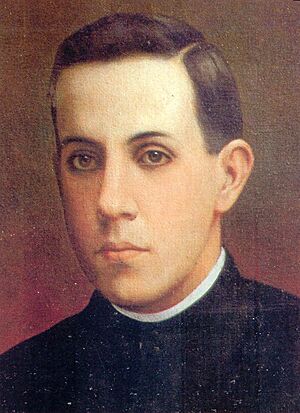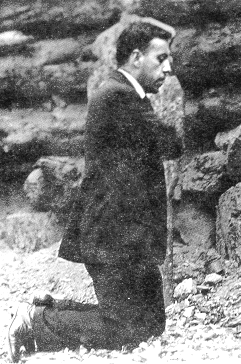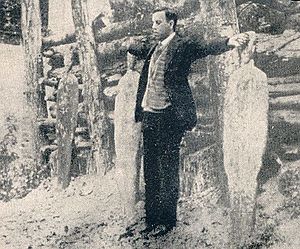Miguel Pro facts for kids
Quick facts for kids BlessedMiguel Pro SJ |
|
|---|---|
| Martyr | |
| Born | January 13, 1891 Guadalupe, Zacatecas, Mexico |
| Died | November 23, 1927 (aged 36) Mexico City, Mexico |
| Venerated in | Roman Catholic Church Lutheran Church |
| Beatified | 25 September, 1988, Saint Peter's Square, Rome by Pope John Paul II |
| Feast | 23 November |
| Controversy | Alleged assassination attempt, lack of trial |
José Ramón Miguel Agustín Pro Juárez, known as Blessed Miguel Pro, was a Jesuit priest from Mexico. He was executed on November 23, 1927, during the time when Plutarco Elías Calles was president. Miguel Pro was falsely accused of being involved in a bombing and an attempt to harm a former Mexican president.
His arrest and execution without a proper trial became very well known during the Cristero War. People saw him as a very religious and innocent person. Because of this, he was later declared a "Blessed" by Pope John Paul II in Rome on September 25, 1988. He is honored as a Catholic martyr, meaning someone who died for their faith.
Contents
Mexico's Difficult Times
At the time Miguel Pro died, Mexico was led by President Plutarco Elías Calles. He was very much against the Catholic Church and its influence. This period was called a "fiercest persecution of religion" by writer Graham Greene. It was a very challenging time for religious people in Mexico.
Miguel Pro's Early Life
Miguel Pro, whose full name was José Ramón Miguel Agustín, was born on January 13, 1891. His family worked in mining in Guadalupe, Zacatecas. He was the third of eleven children, but sadly, four of his siblings passed away when they were very young. People often called him "Cocol" as a nickname. Two of his sisters became nuns. In 1911, when he was 20, he joined the Jesuit order at El Llano.
Becoming a Jesuit Priest
One of Miguel Pro's friends, Pulido, said that he was very clever and funny, but never in a mean way. He was also known for being very kind and could talk about spiritual topics without making them boring. Pulido noted that Miguel Pro had two sides: a playful side and a deeply prayerful side. He spent a lot of time praying in the chapel.
In 1911, Mexico's long-time president, Porfirio Díaz, was removed from power. This led to a period of fighting and change known as the Mexican Revolution.
Miguel Pro studied in Mexico until 1914. Around this time, the government became very anti-Catholic. This forced the Jesuits to leave Mexico and go to Los Gatos, California, in the United States. After that, he studied in Granada, Spain, from 1915 to 1919. Then, from 1919 to 1922, he taught in Nicaragua.
Back in Mexico, a new constitution was created in 1917. Several parts of this 1917 Constitution of Mexico were designed to limit the power of the Catholic Church. For example:
- Article 3 said that schools must teach only non-religious subjects. It stopped the Church from teaching in primary and secondary schools.
- Article 5 made religious orders, like monasteries, illegal.
- Article 24 said that religious services could only happen inside churches.
- Article 27 limited the Church's right to own property.
- Article 130 took away basic rights from priests and religious workers. They could not wear their religious clothes in public, could not vote, and were not allowed to talk about public matters in the news.
Most of these rules against the Church were removed from the constitution in 1998.
For his studies in theology, Miguel Pro was sent to Enghien, Belgium. This is where French Jesuits, who were also in exile, had their theology school. His health was getting worse during this time. He became a priest there on August 31, 1925. He wrote about this special day, saying how happy and emotional he felt. He blessed pictures of his family after the ceremony.
His first job as a priest was to work with miners in Charleroi, Belgium. Even though many workers had different political ideas, he was able to connect with them and share the Gospel. Three months after becoming a priest, he had several surgeries for ulcers. Despite his health problems, he stayed cheerful and brave, saying that his strength came from his prayers.
Returning to Mexico
In the summer of 1926, after finishing his studies in Europe, Miguel Pro returned to Mexico. On his way, he visited Lourdes in France. There, he celebrated Mass and visited the famous grotto of Our Lady of Lourdes.
Miguel Pro arrived in Veracruz on July 8, 1926. By this time, Plutarco Elías Calles was the president of Mexico. Unlike earlier leaders, Calles strongly enforced the anti-Catholic rules from the 1917 constitution. He put in place the Calles Law. This law meant that priests who criticized the government could go to prison for five years. Also, wearing religious clothes outside of churches could lead to a large fine. This law started on July 31, 1926.
Some states, like Tabasco, had already closed all churches and removed priests. Many priests were killed, and some were forced to marry. The few remaining priests had to serve secretly, risking their lives. When Miguel Pro returned, the Church was forced to go "underground." He secretly celebrated the Eucharist and gave other sacraments to small groups of Catholics.
We know about Miguel Pro's secret ministry from his many letters, which he signed with his nickname Cocol. In October 1926, an order was issued for his arrest. He was arrested but released the next day. However, he remained under close watch.
Arrest and Execution
In November 1927, there was an attempt to harm Álvaro Obregón, which only wounded him. This event gave the government a reason to arrest Miguel Pro again, along with his brothers Humberto and Roberto. A young engineer who admitted his part in the attack said that the Pro brothers were not involved. Still, Miguel and his brothers were taken to the Detective Inspector's Office in Mexico City.
On November 23, 1927, Miguel Pro was executed without a trial. President Calles ordered his execution for the assassination attempt. Calles made sure the execution was carefully photographed. The next day, newspapers across the country showed these pictures on their front pages. Calles likely thought these images would scare the Cristero rebels who were fighting against his soldiers. However, the pictures had the opposite effect.
On the night of November 22, 1927, Generals Roberto Cruz and Palomera Lopez visited Pro and his brothers. The next day, as Pro walked from his cell to the courtyard where the firing squad waited, he blessed the soldiers. He then knelt and prayed quietly for a moment. He refused a blindfold. He faced his executioners holding a crucifix in one hand and a rosary in the other. He held his arms out like Christ on the cross and bravely shouted, "May God have mercy on you! May God bless you! Lord, You know that I am innocent! With all my heart I forgive my enemies!" Before the firing squad was told to shoot, Pro raised his arms again and shouted the famous cry of the Cristeros, "¡Viva Cristo Rey!" – which means "Long live Christ the King!" When the first shots did not kill him, a soldier shot him again at very close range.
It is said that President Calles watched a crowd of 40,000 people line the streets for Pro's funeral procession. Another 20,000 people waited at the cemetery where he was buried without a priest present. His father spoke the final words. The Cristeros became even more determined and fought with new energy. Many of them carried the newspaper photo of Miguel Pro standing before the firing squad.
Becoming a Blessed Saint
At Miguel Pro's beatification ceremony in Saint Peter's Square on September 25, 1988, Pope John Paul II spoke about him. He said that even with suffering, illness, and difficult work, Miguel Pro always had a strong and joyful spirit for Christ. The Pope explained that Miguel Pro's deep love for Jesus Christ and his wish to be like Him, even to death, was the reason for his selfless dedication to others.
See also
 In Spanish: Miguel Agustín Pro para niños
In Spanish: Miguel Agustín Pro para niños
 | Victor J. Glover |
 | Yvonne Cagle |
 | Jeanette Epps |
 | Bernard A. Harris Jr. |




